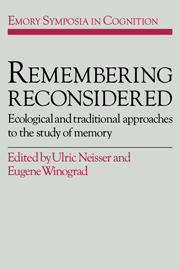Book contents
- Frontmatter
- Contents
- Preface
- List of contributors
- 1 New vistas in the study of memory
- 2 Continuities between ecological and laboratory approaches to memory
- 3 Memory for randomly sampled autobiographical events
- 4 Ordinary everyday memories: Some of the things of which selves are made
- 5 Walking in our own footsteps: Autobiographical memory and reconstruction
- 6 Memory observed and memory unobserved
- 7 The maintenance of marginal knowledge
- 8 The content and organization of autobiographical memories
- 9 The ontogeny of memory for real events
- 10 The functions of event memory: Some comments on Nelson and Barsalou
- 11 “The Wreck of the Old 97”: A real event remembered in song
- 12 Passive remembering
- 13 Remembering without experiencing: Memory for reported events
- 14 What is ordinary memory the memory of?
- 15 Go for the skill
- Name index
- Subject index
15 - Go for the skill
Published online by Cambridge University Press: 25 March 2010
- Frontmatter
- Contents
- Preface
- List of contributors
- 1 New vistas in the study of memory
- 2 Continuities between ecological and laboratory approaches to memory
- 3 Memory for randomly sampled autobiographical events
- 4 Ordinary everyday memories: Some of the things of which selves are made
- 5 Walking in our own footsteps: Autobiographical memory and reconstruction
- 6 Memory observed and memory unobserved
- 7 The maintenance of marginal knowledge
- 8 The content and organization of autobiographical memories
- 9 The ontogeny of memory for real events
- 10 The functions of event memory: Some comments on Nelson and Barsalou
- 11 “The Wreck of the Old 97”: A real event remembered in song
- 12 Passive remembering
- 13 Remembering without experiencing: Memory for reported events
- 14 What is ordinary memory the memory of?
- 15 Go for the skill
- Name index
- Subject index
Summary
There are a few people who think and write so clearly that their work is almost always influential. They can shape a whole field. What they say has to be taken very seriously. Failure to do so can waste a lot of time either because valuable insights are lost or because less-than-valuable insights are followed. Professor Neisser has shown himself to be such a person.
There are some problems that have “garden-path” solutions that are so seductive that psychologists repeatedly take them. Professor Neisser has warned us about many of these, including the reappearance hypothesis and the fact that the physical onset and offset of stimuli are not the psychological onset and offset of stimuli (Neisser, 1967). I think nesting is such a garden path, partly because it contains a kernel of truth and partly because we have been misled by similar concepts in the past. In Gibsonian ecological terms, nesting is a garden path because it makes a structure out of a process.
In what follows, Gibson's use of the word ecological is taken specifically to include the following principle: Although we should always start by making a very good description of the environment before wondering how the animal interacts with the environment, we should not copy that description of the environment into the mind.
- Type
- Chapter
- Information
- Remembering ReconsideredEcological and Traditional Approaches to the Study of Memory, pp. 374 - 382Publisher: Cambridge University PressPrint publication year: 1988
- 15
- Cited by



